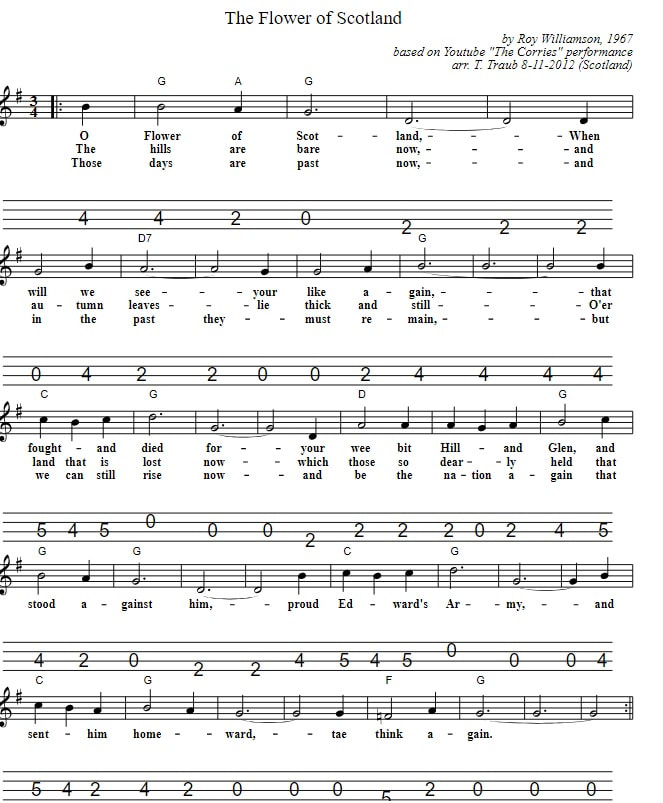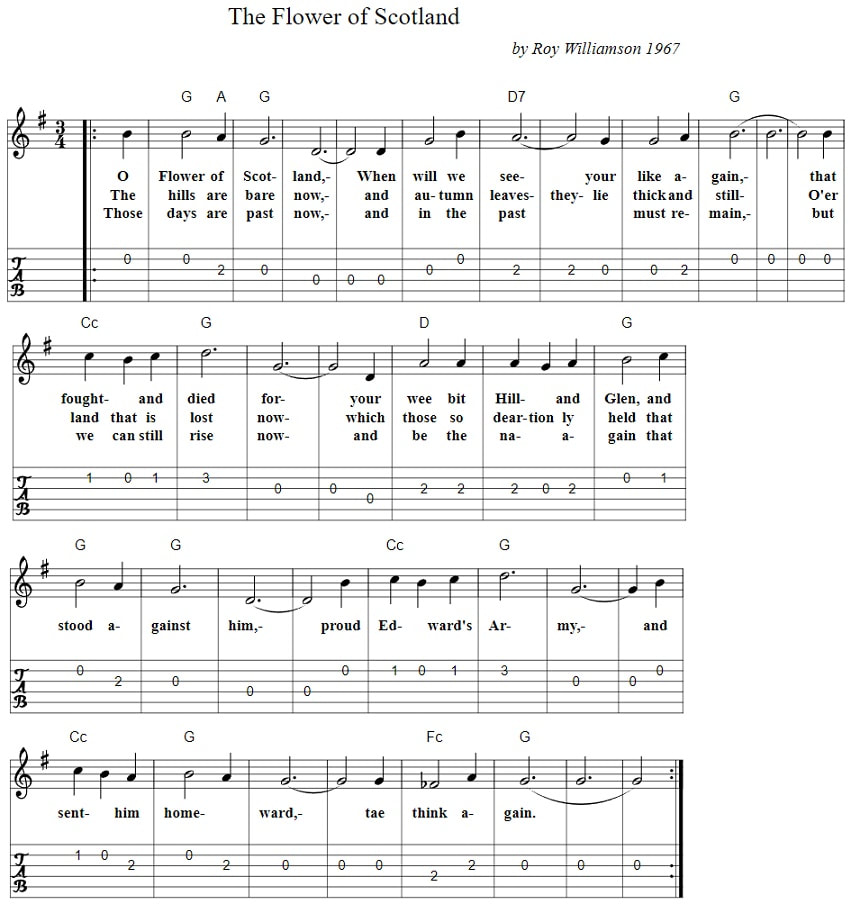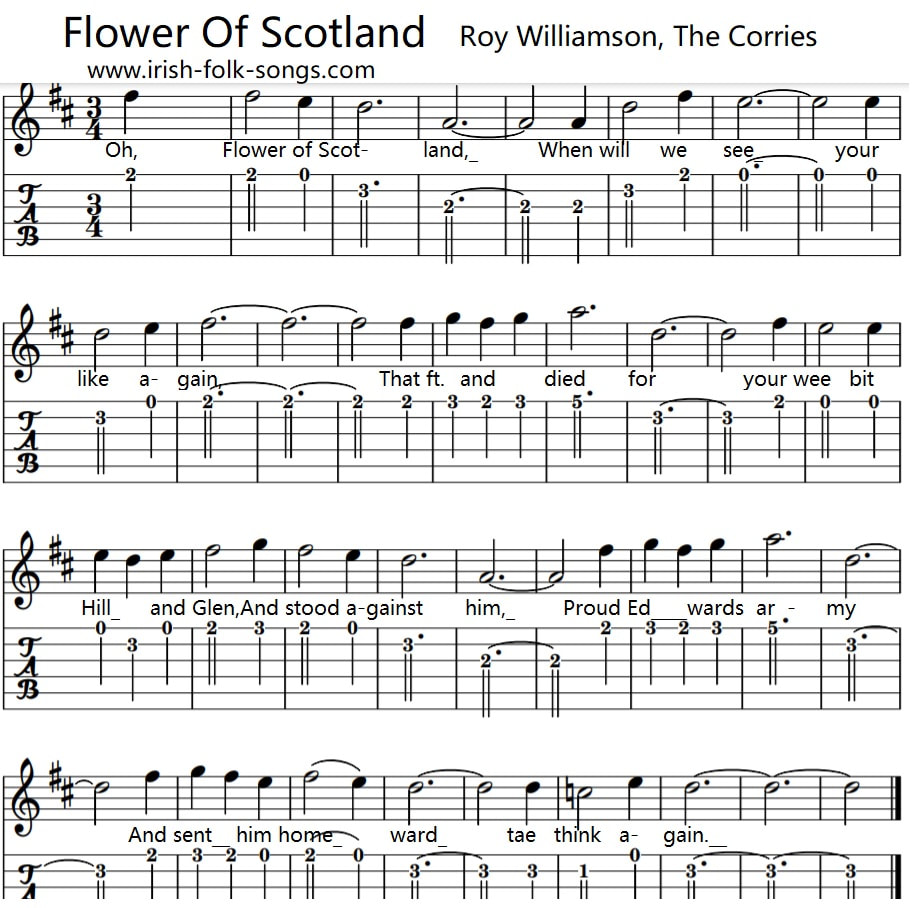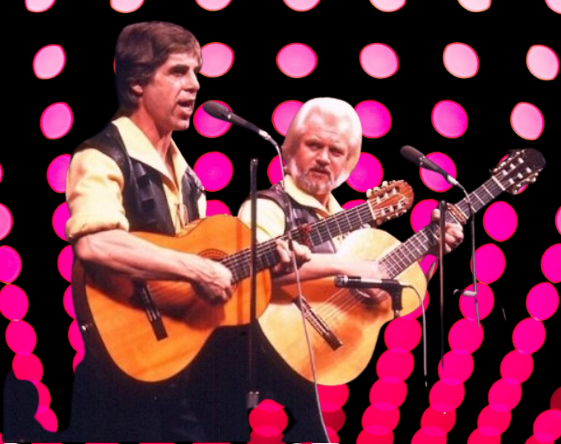Flower Of Scotland Lyrics And Chords
The guitar tab is now included. The Corries And Written By singer / songwriter Roy Williamson. The National Anthem Of Scotland. The youtube video is by The Corries. Also recorded by Amy McDonald and recently by Irish country singer Catlin Murtagh. This song is usually played when the Scottish rugby team are playing international matches, and you'll hear Ireland's Call Song when Ireland are in action. More of the folk songs by The Corries . The guitar chords are very easy to play, just a simple 3 chord job. Also included is the tenor mandola / guitar tab in CGDA tuning.
[A]O flower of Scotland
When will we[E] see
Your like a[A]gain
That[D] fought and[A] died for
Your[E] wee bit hill and[A] glen
[D]And stood a[A]gainst him
Proud Edward's[D] army
And[A] sent him homeward
Tae[E] think a[A]gain
The hills are bare now
And autumn leaves lie thick and still
O'er land that is lost now
Which those so dearly held
And stood against him
Proud Edward's army
And sent him homeward
Tae think again
Those days are passed now
And in the past they must remain
But we can still rise now
And be the nation again
That stood against him
Proud Edward's army
And sent him homeward
Tae think again
Repeat Chorus As Many Times As You Want
When will we[E] see
Your like a[A]gain
That[D] fought and[A] died for
Your[E] wee bit hill and[A] glen
[D]And stood a[A]gainst him
Proud Edward's[D] army
And[A] sent him homeward
Tae[E] think a[A]gain
The hills are bare now
And autumn leaves lie thick and still
O'er land that is lost now
Which those so dearly held
And stood against him
Proud Edward's army
And sent him homeward
Tae think again
Those days are passed now
And in the past they must remain
But we can still rise now
And be the nation again
That stood against him
Proud Edward's army
And sent him homeward
Tae think again
Repeat Chorus As Many Times As You Want
Flower of Scotland —
Since The Corries first performed this song it has steadily grown in popularity until now it is cited as a possible National Anthem for a Scotland re-awakening to its national
identity. Is it any wonder, when we hear the emotive power of the words and tune, reminding us of the carnage of Flodden and the ensuing centuries of repression and domination. These days must certainly remain in the past, but should the spirit that caused them be forgotten; should we forget that we are still a nation by right?
Since The Corries first performed this song it has steadily grown in popularity until now it is cited as a possible National Anthem for a Scotland re-awakening to its national
identity. Is it any wonder, when we hear the emotive power of the words and tune, reminding us of the carnage of Flodden and the ensuing centuries of repression and domination. These days must certainly remain in the past, but should the spirit that caused them be forgotten; should we forget that we are still a nation by right?
Guitar Chords In The Key Of D
[D]O flower of Scotland
When will we[A] see
Your like a[D]gain
That[G] fought and[D] died for
Your[A] wee bit hill and[D] glen
[G]And stood a[D]gainst him
Proud Edward's[G] army
And[D] sent him homeward
Tae[A] think a[D]gain
Key Of G
[G]O flower of Scotland
When will we[D] see
Your like a[G]gain
That[C] fought and[G] died for
Your[D] wee bit hill and[G] glen
[C]And stood a[G]gainst him
Proud Edward's[C] army
And[G] sent him homeward
Tae[D] think a[G]gain
[D]O flower of Scotland
When will we[A] see
Your like a[D]gain
That[G] fought and[D] died for
Your[A] wee bit hill and[D] glen
[G]And stood a[D]gainst him
Proud Edward's[G] army
And[D] sent him homeward
Tae[A] think a[D]gain
Key Of G
[G]O flower of Scotland
When will we[D] see
Your like a[G]gain
That[C] fought and[G] died for
Your[D] wee bit hill and[G] glen
[C]And stood a[G]gainst him
Proud Edward's[C] army
And[G] sent him homeward
Tae[D] think a[G]gain
If you want to play along with the Corries use the chords below.
O [F#]flower of Scotland
When will we [C#]see your [F#]like again
That [B]fought and [F#]died for
Your [C#]wee bit hill and [F#]glen
And stood against him
Proud [B]Edward's [F#]army
And [B]sent him [F#]homeward
Tae [B]think a[F#]gain
The [F#]hills are bare now
And autumn [C#]leaves lie [F#]thick and still
O'er [B]land that is [F#]lost now
Which [C#]those so dearly [F#]held
And stood against him
Proud [B]Edward's [F#]army
And [B]sent him [F#]homeward
Tae [B]think a[F#]gain
[F#]Those days are passed now
And in the [C#]past they [B]must re[F#]main
But [B]we can still [F#]rise now
And [C#]be the nation a[F#]gain
O [F#]flower of Scotland
When will we [C#]see your [F#]like again
That [B]fought and [F#]died for
Your [C#]wee bit hill and [F#]glen
And stood against him
Proud [B]Edward's [F#]army
And [B]sent him [F#]homeward
Tae [B]think a[F#]gain
The [F#]hills are bare now
And autumn [C#]leaves lie [F#]thick and still
O'er [B]land that is [F#]lost now
Which [C#]those so dearly [F#]held
And stood against him
Proud [B]Edward's [F#]army
And [B]sent him [F#]homeward
Tae [B]think a[F#]gain
[F#]Those days are passed now
And in the [C#]past they [B]must re[F#]main
But [B]we can still [F#]rise now
And [C#]be the nation a[F#]gain
The Flower of Scotland song, also known as Scotland the Brave, is a beloved and iconic anthem that has come to represent the national identity and pride of Scotland. Its powerful and emotive lyrics, combined with a stirring melody, have made it a staple at sporting events, political rallies, and other national gatherings. While its origins can be traced back to the early 20th century, the song's enduring popularity and significance can be attributed to its ability to encapsulate the struggles, triumphs, and cultural heritage of the Scottish people.
The origins of the Flower of Scotland song can be traced back to the early 1900s when it was first performed by Scottish singer and songwriter Roy Williamson. However, it was not until the 1960s that the song gained widespread popularity after it was adopted by the Scottish Rugby team as their unofficial anthem. The song's popularity continued to grow in the following decades, with many artists and musicians producing their own renditions of it, further cementing its place in Scottish culture.
At its core, the Flower of Scotland song is a rallying cry for Scottish pride and unity. The lyrics, written in the first person, narrate the story of Scotland's past struggles against the English and its unwavering determination to defend its land and people. The opening lines, 'Oh flower of Scotland, when will we see your like again?' immediately evoke a sense of longing and nostalgia for a bygone era. The following lines, 'That fought and died for your wee bit hill and glen,' pay tribute to the brave men and women who sacrificed their lives for Scotland's freedom and independence. The chorus, with its rousing refrain of 'And stood against him, Proud Edward's army,' serves as a powerful reminder of Scotland's resilience and determination in the face of adversity.
Furthermore, the Flower of Scotland song also celebrates the natural beauty and cultural heritage of Scotland. The lyrics make references to iconic Scottish symbols such as the thistle, the emblem of Scotland, and the mountains and glens that make up its breathtaking landscape. The song's closing lines, 'Those days are passed now, and in the past they must remain,' reflect on the rich history and traditions of Scotland, and the need to preserve and cherish them for future generations.
The Flower of Scotland song has also played a significant role in political and social movements in Scotland. During the 1970s and 1980s, it became a popular anthem for the Scottish National Party and other pro-independence groups. Its use in political rallies and demonstrations helped to galvanize support for the Scottish independence movement and cement its place as a symbol of Scottish national pride.
Moreover, the song's enduring popularity can also be attributed to its versatility and adaptability. It has been adapted and incorporated into various musical genres, from traditional Scottish folk to rock and pop, making it accessible to a wider audience. This versatility has also allowed it to transcend its origins as a simple folk song and become an iconic representation of Scottish culture and identity.
In conclusion, the Flower of Scotland song is much more than just a simple folk song. Its powerful lyrics, evocative melody, and versatility have made it a beloved anthem that captures the essence of the Scottish national identity. Its enduring popularity and significance in Scottish culture have cemented its place as a timeless symbol of Scottish pride and unity. As long as there are Scots, the Flower of Scotland song will continue to be sung with fervor and pride, serving as a reminder of Scotland's rich history, cultural heritage, and unwavering spirit.
The origins of the Flower of Scotland song can be traced back to the early 1900s when it was first performed by Scottish singer and songwriter Roy Williamson. However, it was not until the 1960s that the song gained widespread popularity after it was adopted by the Scottish Rugby team as their unofficial anthem. The song's popularity continued to grow in the following decades, with many artists and musicians producing their own renditions of it, further cementing its place in Scottish culture.
At its core, the Flower of Scotland song is a rallying cry for Scottish pride and unity. The lyrics, written in the first person, narrate the story of Scotland's past struggles against the English and its unwavering determination to defend its land and people. The opening lines, 'Oh flower of Scotland, when will we see your like again?' immediately evoke a sense of longing and nostalgia for a bygone era. The following lines, 'That fought and died for your wee bit hill and glen,' pay tribute to the brave men and women who sacrificed their lives for Scotland's freedom and independence. The chorus, with its rousing refrain of 'And stood against him, Proud Edward's army,' serves as a powerful reminder of Scotland's resilience and determination in the face of adversity.
Furthermore, the Flower of Scotland song also celebrates the natural beauty and cultural heritage of Scotland. The lyrics make references to iconic Scottish symbols such as the thistle, the emblem of Scotland, and the mountains and glens that make up its breathtaking landscape. The song's closing lines, 'Those days are passed now, and in the past they must remain,' reflect on the rich history and traditions of Scotland, and the need to preserve and cherish them for future generations.
The Flower of Scotland song has also played a significant role in political and social movements in Scotland. During the 1970s and 1980s, it became a popular anthem for the Scottish National Party and other pro-independence groups. Its use in political rallies and demonstrations helped to galvanize support for the Scottish independence movement and cement its place as a symbol of Scottish national pride.
Moreover, the song's enduring popularity can also be attributed to its versatility and adaptability. It has been adapted and incorporated into various musical genres, from traditional Scottish folk to rock and pop, making it accessible to a wider audience. This versatility has also allowed it to transcend its origins as a simple folk song and become an iconic representation of Scottish culture and identity.
In conclusion, the Flower of Scotland song is much more than just a simple folk song. Its powerful lyrics, evocative melody, and versatility have made it a beloved anthem that captures the essence of the Scottish national identity. Its enduring popularity and significance in Scottish culture have cemented its place as a timeless symbol of Scottish pride and unity. As long as there are Scots, the Flower of Scotland song will continue to be sung with fervor and pride, serving as a reminder of Scotland's rich history, cultural heritage, and unwavering spirit.
Flower of Scotland tenor guitar / mandola tab in CGDA tuning followed by the standard guitar tab.
Flower of Scotland guitar chords and tabs
Below is the ebook list of Irish Folk Songs with guitar chords
in 3 keys. Price €8.90 and I'll email the ebook after purchase .
The chords are suited to ukulele, banjo or mandolin also.
Martin
in 3 keys. Price €8.90 and I'll email the ebook after purchase .
The chords are suited to ukulele, banjo or mandolin also.
Martin
The Flower Of Scotland Poem
Oh flower of Scotland, so bonnie and bright
With petals of purple, and leaves of green light
Your beauty surpasses the rolling sea
A symbol of freedom, and courage so mighty
From the highlands to the lowlands, you bloom with grace
A symbol of strength, in this ancient place
Your thistle prickles, a warning to foes
But to those who love you, your beauty shows
In fields and meadows, you dance in the breeze
A vibrant reminder, of our land's rich history
For you have witnessed, the battles fought
And stood tall and proud, through every onslaught
Your fragrance fills the air, with a sweet perfume
A reminder of Scotland, in every bloom
And though your life may be fleeting and brief
Your legacy lives on, in our hearts and beliefs
Oh flower of Scotland, so proud and true
You represent a nation, brave and true
With every petal, you tell a story
Of a land that's fierce, and filled with glory
So let us raise our voices, and sing your praise
For you are the flower, that will never fade
Forever blooming, in this bonnie land
The symbol of Scotland, forever in our hands.
Oh flower of Scotland, so bonnie and bright
With petals of purple, and leaves of green light
Your beauty surpasses the rolling sea
A symbol of freedom, and courage so mighty
From the highlands to the lowlands, you bloom with grace
A symbol of strength, in this ancient place
Your thistle prickles, a warning to foes
But to those who love you, your beauty shows
In fields and meadows, you dance in the breeze
A vibrant reminder, of our land's rich history
For you have witnessed, the battles fought
And stood tall and proud, through every onslaught
Your fragrance fills the air, with a sweet perfume
A reminder of Scotland, in every bloom
And though your life may be fleeting and brief
Your legacy lives on, in our hearts and beliefs
Oh flower of Scotland, so proud and true
You represent a nation, brave and true
With every petal, you tell a story
Of a land that's fierce, and filled with glory
So let us raise our voices, and sing your praise
For you are the flower, that will never fade
Forever blooming, in this bonnie land
The symbol of Scotland, forever in our hands.







